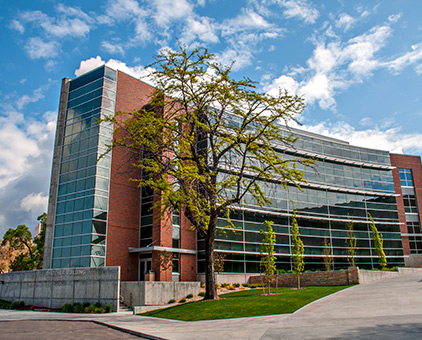Geographic Information Science
Emphases: Climate Change & Landscape Dynamics. Hazards, Resilience, & Human Security. Population, Development, & Sustainability. Remote Sensing of the Environment.
Bennion
Center
Capstones
Program
Hinckley
Institute
Courses
Getting Started
- Meet with an academic advisor
- Take GEOG 1000 - Earth Environments and Global Change, GEOG 1005 (Lab) - Earth Environments and Global Change, and GEOG 1400 - Human Geography
- Take MATH 1050 and WRTG 2010
Making Progress
- Explore minors, certificates, and dual majors
- Learn to generate and read your Degree Audit Report
- Consider which one of our emphases is the right fit for you
- Take a field course
- GEOG 1180 - Introduction to Geo-Programming
- GEOG 3100 - Intro to GIS & Cartography
- GEOG 3020 - Geographical Analysis
- GEOG 3270 - Biogeography: Global Patterns of Life
- GEOG 3400 - Population Geography
Finishing Up
- Take advanced technical courses
- Take a geography seminar course
- Apply for graduation
- Complete your Bachelor's Degree requirements
Community
Getting Started
- Declare Geography as your major!
- Attend Geography Awareness Week activities in November
- Join the Geography Club
- Explore campus activities on the ASUU website
Making Progress
- Attend the Geography Weekly Speaker Series
- Engage in research opportunities with a geography faculty member
- Explore scholarship opportunities through the CSBS Ambassador and Solution Scholars programs
- Attend talks at the Global Change and Sustainability Center, Hinckley Institute of Politics, and Wallace Stegner Center for Land, Resources, and the Environment
- Take on a leadership position in a campus organization
Finishing Up
- Explore and join a professional organization like AAG or GTU
- Join Forever Utah
- Network at the AAG or other professional conference
Knowledge & Skills
Getting Started
- Become familiar with academic resources: e.g. the Marriott Library, CSBS Computing, and Career Services
Making Progress
- Explore geography certificates like GIS, Remote Sensing, Hazards and Emergency Management, and Climate Change
- Conduct an independent study or research with a faculty member
- Look for an internship; you can find opportunities on the Geography/GIS Canvas internship page, through the email listserv, or by working with the Internship Coordinator for CSBS
Finishing Up
- Take a capstone course like GEOG 5161 or GEOG 5131
- Organize your course projects into a portfolio
- Complete an internship
Transformation
Getting Started
- Meet with an academic advisor, career coach, or pre-professional advisor
- Explore Learning Abroad opportunities
Making Progress
- Attend a social or cultural event you have never experienced before: e.g.sports event, museum, concert, play, etc.
- Learn a language!
- Volunteer on an Alternative Break with the Bennion Center
- Travel to a place you've never been before
- Spend a semester abroad through Learning Abroad
Finishing Up
- Work with your Research Advisor to find opportunities to present at a workshop or conference
- Present at CSBS Research Day
- Present at Maps on the Hill
Impact
Getting Started
- Engage in a service opportunity with the Bennion Center and consider the Bennion Scholars program
- Volunteer for local non-profits, museums, or mapping sites
Making Progress
- Explore relevant societal problems by attending a speaker series or other presentations on campus
- Give a presentation to a geography class at a local high school
- Apply for a sustainability grant through SCIF
- Consider joining the Lassonde+X entrepreneurship program
Finishing Up
- Complete the "Where are you now?" survey
- Present or publish research with a faculty member
- Consider writing a thesis
Careers
Getting Started
- Get to know your Career Coach at the CPDC
- Activate your Handshake account to find jobs, internships, and career events
Making Progress
- Talk with an advisor about career options
- Attend career fairs
- Develop a resume
- Attend graduate school career fairs
- Develop a LinkedIn profile
- Attend the Geography Awareness Week Career Panel
- Complete an internship with Hinckley Institute
- Explore graduate school programs
Finishing Up
- Practice interviewing at the CPDC
- Refine your resume and application materials
Start Your Career Journey
Find support at the Career and Professional Development Center (CPDC)
About the Major
*Climate Change & Landscape Dynamics
*Hazards, Resilience, & Human Security
*Population, Development, & Sustainability
*Remote Sensing of the Environment
Regardless of your emphasis, Geography has a long-standing field tradition that often involves travel to spectacular locations, some of which are in our own backyard. As a Geography student at the U, you'll have plenty of opportunities to get your boots muddy! Our program has a "No Student Left Inside‚" Initiative that encourages field work and labs where you will gain technical, real world experiences.
Learning Outcomes
- Understand the scientific discovery process in the discipline of geography.
- Understand at least one geographic subfield.
- Ability to think spatially and conduct basic spatial analysis.
- Ability to critically understand knowledge communicated in written and cartographic forms.
Plan & Prepare
At the U, we plan for our students to have an exceptional Educational Experience identified by four broad categories we call the Learning Framework: Community, Knowledge & Skills, Transformation, and Impact. This major map will help you envision, explore, design, and plan your personalized Exceptional Education Experience with the Learning Framework at the core. In addition to assisting you in planning your coursework and navigating the requirements of your major, this map will help you incorporate other kinds of experiences to expand your knowledge, support your development, and prepare you for the future you want.


